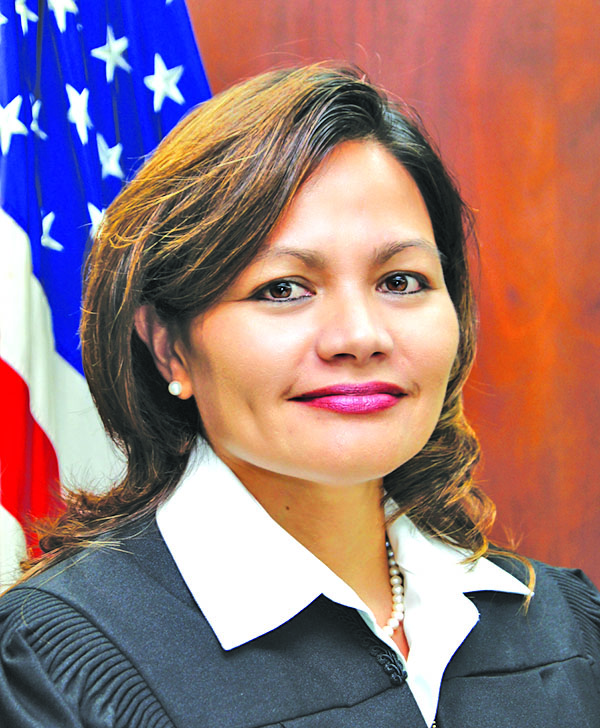Lawyer’s motion to withdraw as counsel for clients in racketeering suit granted

Manglona
U.S. District Court for the NMI Chief Judge Ramona V. Manglona has granted a motion filed by attorney Mark Scoggins to withdraw as counsel for a businessman and his former company as they allegedly failed to pay financial obligations to his law office in connection with their racketeering lawsuit.
In an order issued last Thursday, Manglona said she finds that plaintiffs Il Hwan Kim and KSA Corp. have failed substantially to fulfill their obligations to the Scoggins Law Firm regarding the firm’s services.
Manglona said Kim and KSA have been given reasonable warning that the Scoggins Law Firm planned to withdraw as their counsel and that continued representation will result in an unreasonable financial burden on the firm.
Manglona directed the court’s clerk to terminate the Scoggins Law Firm and its attorneys Mark A. Scoggins and Rene Holmes as counsel for Kim and KSA.
The judge ordered Kim to appear at a status conference for Jan. 24, 2019 at 10am.
Kim, who lives in Seoul, Republic of Korea, is allowed to appear telephonically. He was instructed to contact the clerk’s office for dial-in instructions.
Manglona said it is Kim’s responsibility to arrange for an interpreter, if needed.
Manglona said defendant Jeong Eun Taek is not ordered to appear, but may do so if he so wishes.
Citing a precedent case, the judge said it is well settled that “a corporation may appear in the federal courts only through licensed counsel.”
Manglona said although Kim may appear pro se or without a lawyer and represent himself in this matter, he may not appear for KSA.
Kim is the sole shareholder of KSA.
Manglona said failure to secure new counsel may lead to dismissal of KSA from this lawsuit.
Manglona heard Scoggins’ motion to withdraw as counsel last Thursday. Scoggins and Holmes appeared. Kim and the only served defendant, Eun Taek Jeong, did not appear.
Scoggins informed the court that last Oct. 30, he sent Kim an email informing him that because of a conflict of interest, Kim would have to hire a new Korean interpreter.
Scoggins said he did not get a response from Kim until last Dec. 21, when Kim called with the assistance of a person who spoke some English.
Scoggins emphasized the need for Kim to hire a professional interpreter.
After not hearing back from Kim, last Jan. 3 Scoggins notified him that the firm was planning to file a motion to withdraw.
Scoggins filed the motion to withdraw the following day, Jan. 4.
Kim responded that he would be calling the firm on Jan. 14.
Scoggins said Kim did not call that day and still had not called.
The lawyer said not only has communications been difficult, but Kim and KSA have not met their financial obligations to pay the firm for work already performed.
In his motion, Scoggins said despite almost daily attempts to communicate with his clients—Kim and KSA Corp.—for a period of several months they have not responded.
The lawyer said despite the same repeated attempts at communication, Kim and KSA have not met financial obligations to his office for a period of some months.
“KSA and Mr. Kim have made promises, but have not kept their promises,” he said.
Last March, Manglona dismissed Kim’s and KSA’s claims against Joann P. Hensley, who is among the three persons that then-remained as defendants in the racketeering lawsuit.
Manglona dismissed with prejudice the claims against Hensley following the request of Kim and KSA.
Dismiss with prejudice means Kim and KSA can no longer re-file the claims against Hensley.
Kim and KSA asked the court to issue a default judgment against defendants Hensley, Hun Jin An, and Jeong Eun Tack who allegedly continue to fail to file any answer or other responsive pleadings in this case.
At a hearing on the motion for default judgment, Manglona pointed out that Hensley filed an answer and that the court did not see a proof of service filed for the motion.
Rene Holmes, co-counsel for Kim and KSA, conferred with Kim, then moved to dismiss the claims against Hensley.
Manglona granted the motion.
Manglona stated that the court did not have jurisdiction on An because he was never legally served with the lawsuit.
Manglona stated that the service on Taek was proper.
Kim and KSA alleged in their lawsuit that the defendants conspired to steal millions of dollars from him for his hotel and casino project on Saipan.
Aside from those three defendants, Kim and KSA Corp. also sued a former lawmaker, a Department of Public Lands employee, and 10 unnamed co-defendants pursuant to Racketeer Influence and Corrupt Organizations Act (RICO) and other causes of action.
The plaintiffs asked the court to hold the defendants liable to pay them damages, court costs, and attorney’s fees.
The court subsequently dismissed with prejudice the claims against the former lawmaker and the DPL employee.























